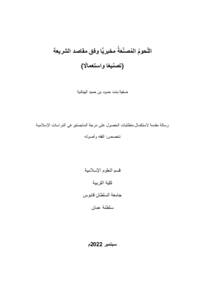Document
مقاصديـة الثـواب والعقاب بين النص القرآني والفكر العقدي الإسلامي وأثـرها فـي سلـوك الـمسلــم.
Publisher
جامعة السلطان قابوس.
Gregorian
2021
Language
Arabic
English abstract
The study seeks to compare the aims (maqāṣid) of Reward and Punishment
between the Quranic text and the Islamic doctrinal ideology and their impact on the
Muslim's behavior. It intends to achieve this by exploring these aims in the Qur'anic text
and investigating how they are dealt with by the doctrinal ideology and then comparing
this with the Qur'anic approach in building issues on aims. By doing so, it aims to explore
the extent to which the Islamic doctrinal ideology is close or far from the Qur'anic text in
its rooting of Reward and Punishment based on divine purposes, and how building the
issue on purposes could influence the life of Muslims today.
The study is based on the following research methods; inductive, analytical,
deductive, comparative, and critique. The study is divided into three chapters, preceded by
an introduction which provides a definition of Reward and Punishment and their concepts
in the Holy Qur'an, a discussion of the characteristics of the Islamic doctrinal ideology,
and its most famous researched schools. The first chapter deals with "The Aims of
Reward and Punishment in the Holy Qur'an" and explores some of the verses of
Reward and Punishment stated in the Holy Qur'an in this life and the hereafter and the
analysis of these verses in some Qur'an interpretation books in order to draw out the
purposes of the Holy Qur'an in establishing this principle (Reward & Punishment). The
second chapter focusses on "The Aims of Reward and Punishment in the Islamic
Doctrinal Ideology", by tracing what has been written about Reward and Punishment by
some scholars of fundamentals of religion in the most famous theological schools in Islam
(Abadhi, Mu'tazila, Ash'ari, and Maturidi), analyzing their argument and comparing it
against how it is based on aims by the Holy Qur'an in order to disclose the dominant
approach in rooting this chapter, and the extent to which these scholars are close to or far
from the Qur'anic intensions. The third chapter deals with "The Effects of the Aims of
Reward and Punishment on the Muslim's Behavior," by deducing the behavioral and
social impact from some of the divine aims of Reward and Punishment so that the
greatness of building dogmatic issues on aims is manifested.
The study concluded that the Qur'anic text has built the principle of Reward and
Punishment on a number of aims which are more regulating for the behavior of an
individual and the society and more successful in enabling Muslims to win the great
reward in the hereafter. Concerning the Islamic doctrinal ideology, it has avoided the
divine intentional view in dealing with it in the chapter of wac
d and wac
īd (Promise and
Threat), which has a serious influence on the behavior of the present Muslim. Therefore,
Muslims need to understand the concepts of Reward and Punishment by deducing it within
the parts of the Qur'anic context that are related to the intentional dimension.
Member of
Resource URL
Arabic abstract
هدفت الدراسة إلى مقارنة مقاصدية الثواب والعقاب بين النص القرآني والفكر العقدي الإسلامي؛ من خلال استقراء مقاصد الثواب والعقاب في النص القرآني، وتتبع معالجة الفكر العقدي لها، ثم مقارنتها بالطرح القرآني في بناء المسألة على مقاصد؛ للكشف عن مدى قُرب الفكر العقدي الإسلامي وبُعده من النص القرآني في تأصيله للثواب والعقاب على مقاصد ربانية، وأثر بناء المسألة على مقاصد في حياة المسلم اليوم، اعتمادًا على المناهج البحثية: الاستقرائي، التحليلي، الاستنباطي، المقارن، والنقدي. وتكوَّن البناء الهيكلي للدراسة من ثلاثة فصول، سُبقت بتمهيدٍ تناول التعريف بالثواب والعقاب، ومفهومها في القرآن الكريم، وعَرْضًا لمعالم الفكر العقدي الإسلامي، وأشهر المدارس المبحوث عنها. أما الفصول؛ فقد جاءت وفق الآتي: تناول الفصل الأول "مقاصد الثواب والعقاب في القرآن الكريم"، وعُني باستقراء بعض آيات القرآن الكريم في الثواب والعقاب في الدارين، وتحليلها من بعض كتب التفسير؛ لاستنباط مقاصد القرآن في تأسيس هذا المبدأ. وركَّز الفصل الثاني على "مقاصد الثواب والعقاب في الفكر العقدي الإسلامي"، من خلال تتبع ما كتبه بعض علماء أصول الدين في أشهر المدارس العقدية في الإسلام - الإباضية، المعتزلة، الأشاعرة، والماتريدية- لمسألة الثواب والعقاب، وتحليل نقاشهم فيها، ومقارنة تلك المعالجة بتأصيل القرآن لها على مقاصد؛ للكشف عن المنهجية الطاغية في تأصيلهم لهذا الباب، ومدى قربهم من المقاصد القرآنية أو بعدهم عنها. وعَالج الفصل الثالث "مقاصد الثواب والعقاب وأثرها في سلوك المسلم"، من خلال استقراء الأثر السلوكي والاجتماعي من بعض المقاصد الربانية للثواب والعقاب؛ حتى يتجلى عِظم بناء المسائل على مقاصد في شتى أبواب العقيدة، منها باب الثواب والعقاب.
وخلُصت الدراسة إلى أن النصَّ القرآني أصَلّ مسألة الثواب والعقاب على جملة من المقاصد هي أقوم لسلوك الفرد والمجتمع في الدنيا، وأنجع للمسلم في الفوز بالثواب العظيم في الآخرة. أما الفكر العقدي الإسلامي؛ فقد ابتعد عن النظرة المقاصدية الربانية في معالجته لها في باب الوعد والوعيد، ممَّا كان له أثرٌ خطيرٌ في سلوك المسلم المعاصر؛ والذي يُحتم على المسلم ضرورة فهم الثواب والعقاب من خلال إسقاط المسألة في السياق القرآني المرتبط بالبُعد المقاصدي
وخلُصت الدراسة إلى أن النصَّ القرآني أصَلّ مسألة الثواب والعقاب على جملة من المقاصد هي أقوم لسلوك الفرد والمجتمع في الدنيا، وأنجع للمسلم في الفوز بالثواب العظيم في الآخرة. أما الفكر العقدي الإسلامي؛ فقد ابتعد عن النظرة المقاصدية الربانية في معالجته لها في باب الوعد والوعيد، ممَّا كان له أثرٌ خطيرٌ في سلوك المسلم المعاصر؛ والذي يُحتم على المسلم ضرورة فهم الثواب والعقاب من خلال إسقاط المسألة في السياق القرآني المرتبط بالبُعد المقاصدي
Category
Theses and Dissertations



